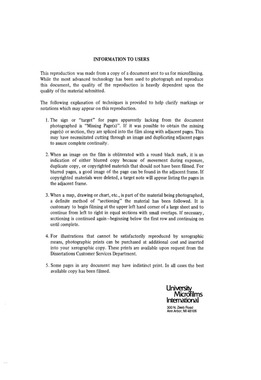| dc.contributor.author | Huckabay, Evert Keith, | en_US |
| dc.date.accessioned | 2013-08-16T12:28:53Z | |
| dc.date.available | 2013-08-16T12:28:53Z | |
| dc.date.issued | 1983 | en_US |
| dc.identifier.uri | https://hdl.handle.net/11244/5118 | |
| dc.description.abstract | The problem studied was the following: "What change strategies/tactics are used by training managers in implementing new training programs or departments within the environment of large data processing organizations?" | en_US |
| dc.description.abstract | One of the principal conclusions to be drawn from analysis of the interviews is the great importance assigned to top management support by the interviewees. This emerged as the interviewees' principal concern in implementing a training program...and it is a concern at all points from initiation throughout the lifetime of the program. | en_US |
| dc.description.abstract | The study examined training programs in large data processing organizations. Nine training programs were studied; these were chosen from programs recommended by a panel of training experts. | en_US |
| dc.description.abstract | Another of the principal findings in the study concerns the distinction made in the study between management-initiated and staff-initiated programs. Management-initiated programs were begun by top management or "adopted" at the time they were proposed. Staff-initiated programs were begun by staff members and have continued to be identified with them. Systematic analysis of the information in the interviews reveals that these two characteristics appear to be related to other program characteristics such as earlier unsuccessful efforts to implement programs, resistance during initiation/implementation, amount of management "selling" required, and management support. The data indicate that the management-initiated program is not likely to have been preceded by unsuccessful attempts; it is less likely to encounter resistance; it will be less likely to require management selling; and it will be more likely to have top management support. From these and other such conclusions a model for implementing training programs was derived and various recommendations were developed. | en_US |
| dc.description.abstract | In-depth minimally structured interviews were conducted with the training managers from the nine data processing organizations. The interviews focused on the request that the interviewee explain the history of the change project. The interviews were tape recorded and then transcribed. The transcripts were analyzed by use of frequency tables, a comparison chart, and brief summaries of the interviews. This process allowed an evaluation and synthesis of data. | en_US |
| dc.format.extent | vi, 159 leaves ; | en_US |
| dc.subject | Education, General. | en_US |
| dc.title | Strategies and tactics for planned change in the technology-driven organization. | en_US |
| dc.type | Thesis | en_US |
| dc.thesis.degree | Ph.D. | en_US |
| dc.thesis.degreeDiscipline | Jeannine Rainbolt College of Education | en_US |
| dc.note | Source: Dissertation Abstracts International, Volume: 44-02, Section: A, page: 0327. | en_US |
| ou.identifier | (UMI)AAI8314768 | en_US |
| ou.group | Jeannine Rainbolt College of Education | |
